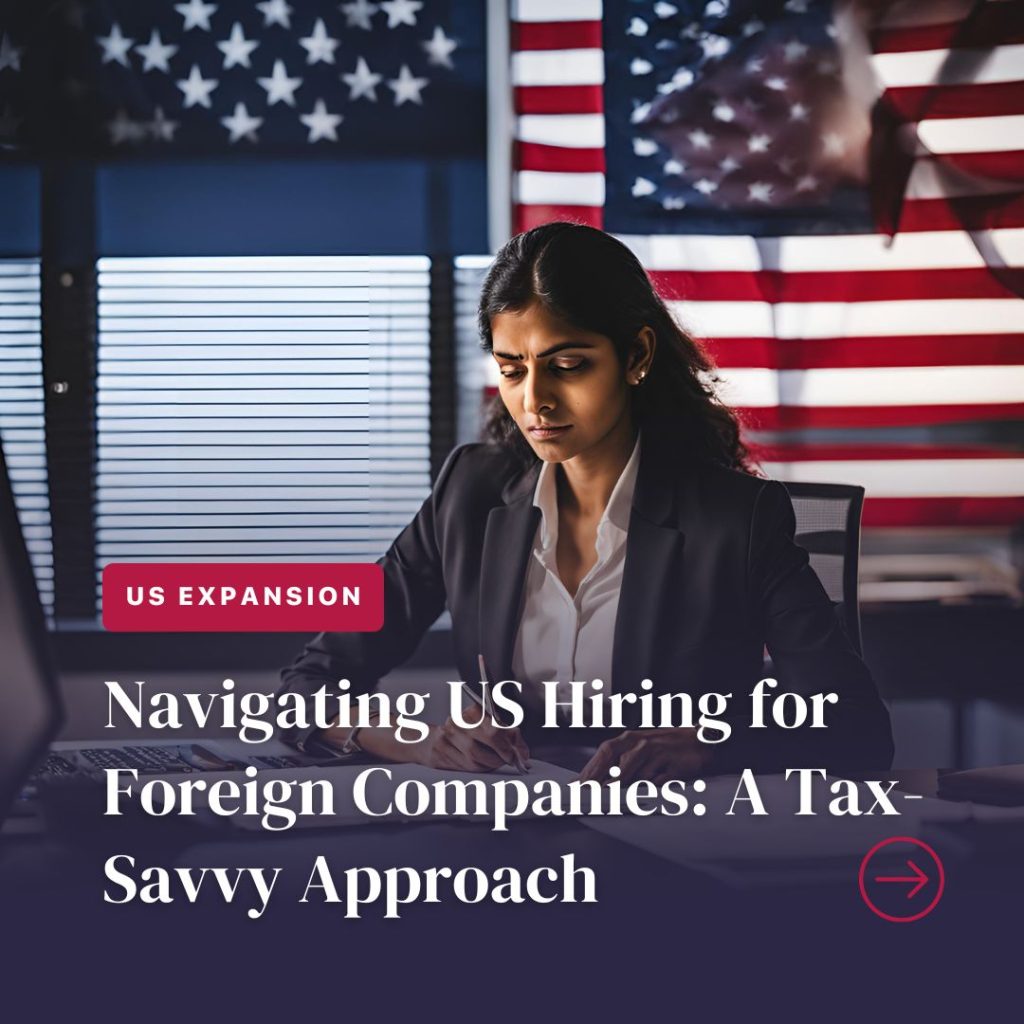In today’s global economy, expanding into the US market is a strategic move for many foreign companies. However, navigating the complex landscape of US employment and tax regulations can be daunting. This blog post aims to guide non-US companies through the intricacies of hiring in the United States while optimizing their tax position.
Foreign companies are drawn to the US for various reasons: access to a large consumer market, a skilled workforce, and opportunities for growth and innovation. However, tapping into these benefits requires a thorough understanding of the US hiring process and its tax implications.
Understanding Employment Models
When hiring in the US, foreign companies have several options:
- Using an Employer of Record (EOR): An EOR is the legal employer for US-based workers, handling payroll, benefits, and compliance.
- Using a Professional Employer Organization (PEO): A PEO offers a co-employment model in which you share employer responsibilities with your US company.
- Hire employees directly through your US entity.
- Hiring independent contractors: This model involves engaging self-employed individuals for specific projects or roles.
Tax Implications of Each Model
When expanding your business operations to the United States, understanding the tax implications of different hiring models is crucial. This section will explore the tax responsibilities associated with three primary models: Employer of Record (EOR), Professional Employer Organization (PEO), and Direct Hiring.
Employer of Record (EOR)
When using an EOR, the provider takes responsibility for all employment-related taxes through their US entity, relieving you of the risk and cost of employing in the US. However, you may still have corporate or sales tax obligations.
Professional Employer Organization (PEO)
When using a PEO, you’ll typically pay a monthly fee per employee. The PEO handles most employment tax responsibilities, including withholding and remitting payroll taxes. However, your company remains responsible for corporate income taxes.
Direct hiring
If you establish a US entity and hire employees directly, you must navigate corporate taxes, payroll taxes, and employee withholding. This includes federal income tax, Social Security, Medicare, and state-specific taxes.
Independent contractors
With this model, you’re not responsible for payroll taxes. Instead, you must issue 1099 forms for contractors earning over $600 annually. Contractors are accountable for their self-employment taxes. It’s essential to avoid employee misclassification when working with contractors. If you direct their work, determine their hours, or if they are working full-time for you, they may genuinely be employees, putting you at risk for fines and back wages.
Compliance Considerations
When operating a gig economy business, navigating the complex landscape of federal and state tax regulations is crucial. While federal tax laws apply consistently across the United States, state tax requirements vary significantly, from no income tax to intricate systems with multiple brackets.
Federal vs. state tax requirements
While federal tax laws apply uniformly across the US, state tax requirements can vary significantly. Some states have no income tax, while others have complex systems with multiple brackets.
Reporting obligations
Depending on your hiring model, you may need to file various forms with the IRS and state tax authorities. These can include Form 941 (Employer’s Quarterly Federal Tax Return), Form 940 (Federal Unemployment Tax Return), and state-specific forms.
Potential penalties for non-compliance
Failing to meet tax obligations can result in substantial penalties. These may include fines, interest on unpaid taxes, and, in severe cases, legal action.
Strategies for Tax Optimization
Understanding and implementing effective tax strategies is crucial to maximizing profitability when operating a business in the United States. This section will explore several key approaches to consider.
Choosing the proper business structure
The type of entity you establish in the US (e.g., C-corporation, LLC) can significantly impact your tax liability. Each structure has different tax implications and benefits.
Understanding tax treaties
The US has treaties with many countries to prevent double taxation. Familiarize yourself with any applicable treaties to optimize your tax position.
Utilizing tax credits and deductions
The US tax code offers various credits and deductions to reduce your tax burden. These may include the Research and Development (R&D) tax credit, work opportunity tax credit, and deductions for business expenses.
Case Studies
Companies are increasingly expanding their operations beyond their domestic borders in today’s interconnected business world. This global expansion often necessitates hiring employees in foreign countries. However, navigating different jurisdictions’ complex legal and administrative landscape can be daunting. Employer of Record (EOR) services and Professional Employer Organizations (PEOs) have emerged as popular solutions to streamline these processes.
This section delves into three case studies highlighting how different types of businesses have leveraged EORs and PEOs to manage their global workforces effectively. We will explore each approach’s benefits, challenges, and considerations.
Case 1: Tech startup using an EOR
A European tech startup wanted to hire a small team in Silicon Valley. To manage their US employees, they used an EOR, which simplified compliance and allowed them to focus on growth. The EOR handled all payroll taxes and compliance, while the startup remained responsible for corporate taxes on US-sourced income.
Case 2: Manufacturing company with a PEO
A Japanese manufacturer established a US subsidiary and partnered with a PEO to manage its workforce. The PEO’s economies of scale resulted in cost savings on benefits and streamlined HR processes. The company paid the PEO a monthly fee per employee but maintained control over day-to-day operations.
Case 3: Consulting firm using independent contractors
A UK-based consulting firm engaged US-based experts as independent contractors for client projects. They carefully structured agreements to ensure contractors met IRS criteria for self-employment, avoiding misclassification issues. The firm issued 1099 forms for each contractor but wasn’t responsible for payroll taxes.
Best Practices
Navigating the complexities of US international tax laws can be daunting. To ensure compliance and minimize risks, adhering to certain best practices is essential. Let’s delve into critical areas that can significantly impact your business’s tax obligations.
Record-keeping
Maintain detailed records of all financial transactions, tax filings, and employee information. Good record-keeping is crucial for tax compliance and can protect you in case of an audit.
Working with tax professionals
Given the complexity of US tax laws, working with experienced tax professionals who specialize in international business is advisable. They can help you navigate complex regulations and identify tax-saving opportunities.
Staying updated on tax law changes: US tax laws are subject to frequent changes. Review updates from the IRS and state tax authorities regularly or ensure your tax advisor keeps you informed of relevant changes.
Conclusion
Hiring in the US presents both opportunities and challenges for foreign companies. Understanding different employment models and their tax implications allows you to make informed decisions that align with your business goals and minimize tax liabilities.
Key takeaways include:
- Choose the suitable employment model based on your business needs and risk tolerance.
- Work with a provider that can transition you to a different hiring model as your needs change.
- Understand the tax implications of each hiring approach.
- Stay compliant with both federal and state tax requirements.
- Leverage tax treaties and available credits/deductions to optimize your tax position.
- Maintain accurate records and work with experienced tax professionals.
Remember, while this guide provides a foundation for understanding US hiring and tax considerations, each company’s situation is unique. Careful planning and expert advice are crucial to developing a tax-efficient strategy for your US operations. By taking a proactive, informed approach, you can successfully navigate the complexities of US hiring and taxation, positioning your company for growth in the American market.
Contact Us Today! 👇
Laurie Spicer
UK Based
Over 25 years experience doing business in North American, European, and Asian markets with a primary focus and specialism on the complexity of the US market.


